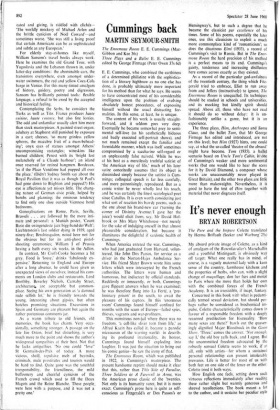It's never enough
BRYAN ROBERTSON
The Pure and the Impure Colette translated by Herma Briffault (Seeker and Warburg' 25s1 My absurd private image of Colette, as a kind of amalgam of the Rosenkavalier's Marschallirt and a youthful Mistinguett, is obviously way off target: What one really has in mind, of course, is a vaguely maternal lady with a keen sense of the country, farmhouse kitchens and the properties of herbs, who can, with a slight change of maquillage, don her furs and motor to Paris where she more than holds her own with the combined forces of the French Academy. It is an irresistible, if inapt, fantasy.
Concerned in this book with what is pedanti- cally termed sexual deviation, but should per- haps rather be considered as biochemical im- pulse, Colette characteristically comes down in favour of a responsible freedom with a deeply reasoned predilection for bisexuality. `How many sexes are there?' bawls out the quaver- ingly dignified Major Bloodnock in the Goon Show. 'Three,' comes the answer. 'Not enough, say I,' the old boy yells back, and I agree. But the uncommitted freedom advocated by the robustly sensual Colette seems to work, if at all, only with artists—for whom a sustained personal relationship can present intolerable pressures. Life is better for most of us with both feet on one side of the fence or the other. Colette tried it both ways.
How English one feels, setting down such virtuous reflections inunediately after reading these rather slight but warmly generous and shrewd recollections. The -book meant a lot to the author, and it sustains her peculiar style of thinking compounded of a love for life in all its most spontaneous and self-expressive forms with a feline contempt for self-indulgent weakness, pathos or dependency on anything or anybody. Colette was mostly a free soul.
She is very good on her friend Marguerite Moreno, the actress, whom English readers may recall as the irate Juno in the film of Girau- doux's Amphitryon 38 or the haughty dowager- concierge sorting out arrivals for Heaven or Hell behind the desk in Sartre's film Les Jeux son: faits. Colette describes her falling asleep in the middle of a conversation: 'Her strong, sexless features softened a little as she sank into the sudden sleep of all trained workers who know how to recoup their strength by taking a nap in the 'bus or the metro. . . . Sitting or leaning, they sleep the sleep of the careworn, the weary, the conscientious worker.'
Elsewhere the book recounts touchingly the history of two Welsh lesbian friends, in the early nineteenth century, whose essential inno- cence was matched only by then self-contained devotion to each other; an extraordinary series- of meetings with 'Renee Vivien' in Paris, whose exotic household concealed the tragedy of emptiness, despair and a naïvely willed fatality; and the homosexual rendezvous which pro- Vided such comfort and amusement for Colette at a low ebb in her own affairs. She was not the first female intellectual to share an almost masculine camaraderie with men which at once deepened and undermined her more normally instinctive preoccupation with them.
Some of the pieces in this short book (published in 1932) appear also in Earthly Paradise, that ,masterwork of editing which appeared a year or so ago and contained the best of all Colette's autobiographical writings, and the residue of fresh material is frugally deployed. (Hovering over the book is the haunt- ing image of Cherie trying on Lea's pearl necklace.) This is not a good introduction to Colette but for devotees it is still compulsive reading, graced by an exemplary preface by Janet Flanner.



















































 Previous page
Previous page